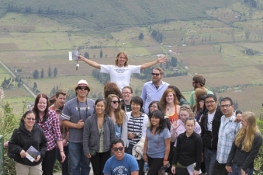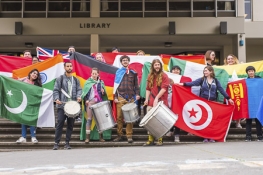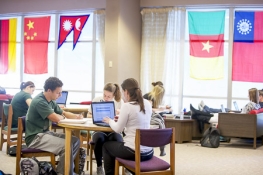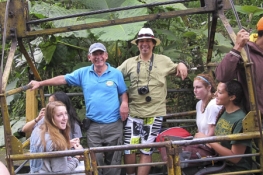Second Language & Study Abroad
Language Questions
What languages can be used to fulfill the degree requirement?
We teach Spanish, French, German and Chinese at Humboldt to varying levels. You may use all these for your International Studies degree. However, if you are already proficient in a second language, the language faculty can help you establish your proficiency and it can be used for your degree.
What do I do if I know a second language but have no college credit?
Speak to the faculty of the World Languages and Cultures Department in the first instance. We have a program for heritage Spanish speakers and you may be able to test out of some or all of your language classes here. If it is a language not taught here at Humboldt, you may still be able to test out of further language courses here at Humboldt, but that would have to be discussed with the language faculty and approved on a case by case basis. We would also hope and expect that even if students have a language already, they would continue language studies in a language we offer here at Humboldt.
Study Abroad Questions
When should I start thinking about studying abroad?
When should I start thinking about studying abroad?
Now! The earlier you plan the more options you will have. See the Study Abroad Office for more information. They have regular/required planning sessions posted on their website.
Do the classes I take during study abroad count?
Do the classes I take during study abroad count?
They can - IF you plan ahead. Always consult your adviser, the Study Abroad Office or the University transfer/graduation adviser before assuming any credit taken abroad will ‘count’ toward your requirements at Humboldt.
What if I have already spent time abroad – do I have to go again?
What if I have already spent time abroad – do I have to go again?
The International Studies program requires that the study abroad experience be broadly academic in nature and of a sufficient length (about 10 weeks or the equivalent of 12 units college credit) to build inter-cultural communication skills in support of our learning outcome of cultural competency. It should also support the language and/or Concentration learning outcomes.
What doesn’t count?
What doesn’t count?
- Vacations (even extended trips, while an excellent way to gain experience of different languages or cultures and may help support language proficiency – they are not the same as a sustained academic experience with language or course content and cannot be assessed)
- Short term mission work (while many may be excellent opportunities for growth/leadership development and inter cultural experiences and may help establish language proficiency, we have no record of progress or assessment)
- Experience at very young age (i.e., grew up/spent time prior to the age of 15 in another country – though this may support a claim to language proficiency and/or to proceed quickly through the language requirement – as assessed by WLC Department)
- High school exchange programs – though some types of community college experiences might be accepted
- Active military deployment that does not involve cooperative/collaborative community engagement
- Military overseas education that does not involve local/intercultural component (e.g., taking courses from faculty on base and/or online education undertaken while overseas while on duty)
What kinds of experience or circumstance might qualify me for accommodation or exception?
What kinds of experience or circumstance might qualify me for accommodation or exception?
- Previous academic experience equivalent to level and length of college level semester
- Previous supervised intercultural exchange experience equivalent to level and length of college level semester (e.g., programs that provide extended/organized and supervised experiences abroad)
- Previous living experience at high school/college/older age (though this will vary significantly depending on the length of stay, etc.)
- Military experience that actively involves local engagement/local language use and supervision, e.g., some types of communications roles, training programs, education and cultural exchanges, democracy/capacity building are increasingly using military personnel rather than State Department or other government agencies and these, depending on the responsibilities of the officers
- An international internship or employment with a governmental agency such as the State Department, an intergovernmental organization such as the United Nations, the international headquarters of a nongovernmental organization or other agency/organization such as Amnesty International in which international research, language skills and global issues are the core of the experience
- If you are unable to travel abroad with assurance of being able to return
- If you have previously studied on an F1 Visa at a CSU
If I think I qualify for a study abroad accommodation or exception, what do I do?
If I think I qualify for a study abroad accommodation or exception, what do I do?
You should speak to the Program Leader prior to - or as you declare International Studies as your major as accommodations and any possible exceptions can only be done at that point. Anyone already in the major will be held to the requirements as laid out and applications for accommodation or exception made after declaring the major will only be considered on the basis of exception/unforeseeable circumstances.
If you are just entering the major and think you qualify for an accommodation or an exception, set up a meeting with the Program Leader, and bring any documentation you may have as to the kind of program or experience you have done, e.g., transcripts, military records, letters, etc. All requests will be considered on a case by case basis.












